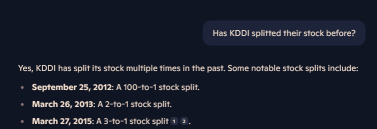No Data
9433 KDDI
- 2523.5
- -11.0-0.43%
- 5D
- Daily
- Weekly
- Monthly
- 1Q
- 1Y
Trade Overview
Capital Trend
No Data
News
The Nikkei average rose by 62 yen, extending its rise for five consecutive days, with a strong wait-and-see sentiment and low movement = 30 days before the market.
Thirty days ago, the Nikkei Stock Average closed at 35,902.51 yen, up 62.52 yen compared to the previous business day, marking a five-day streak of gains. The TOPIX (Tokyo Stock Price Index) also rose by 9.63 points to 2,660.24 points. At 9:09 AM, the Nikkei peaked at 36,023.24 yen, up 183.25 yen. After the initial buying, the market struggled for direction, and with the exchange rate fluctuating towards a stronger yen at around 142 yen per dollar, there were moments of decline. In Extended hours trading, U.S. stock index futures were.
Kanematsu, Marubeni, ETC [List of stock materials from the newspaper]
*Kanematsu <8020> IT staff increased by 2.5 times, expanding orders for virtual Servers, and planning to acquire an information-related company within the fiscal year (Nikkan Kogyo, Front Page) -○ *ORIX <8591> sold 8 companies to NEC Group for 18 billion yen (Nikkan Kogyo, Page 3) -○ *Sony Group Corp <6758> has no concrete plans for separating the Semiconductors business (Nikkan Kogyo, Page 3) -○ *Marubeni <8002> accelerates investment in consumer Business, establishing a new company through corporate discovery (Nikkan Kogyo, Page 4) -○ *Toyota Tsusho <8015> invests in a US electrolytic iron manufacturer to secure raw materials for 'green Steel'.
Fair Home: Valued Effort: Pairwork App Launches in the US to Quantify Housework
Recovery to 35,000 yen due to easing of US-China trade tensions and expectations from the Japan-US finance ministers' meeting.
The Nikkei average continued to rise, finishing the day at 35,039.15 yen, up 170.52 yen, recovering the 35,000 yen mark for the first time in three weeks with an estimated Volume of 1.8 billion 80 million shares. The U.S. market on the 23rd rose on expectations of easing U.S.-China trade tensions following reports from U.S. Broadcasting that the Trump administration is considering lowering tariffs on China. Following this trend, the Tokyo market began with Buy activity focused on high-tech stocks, and the Nikkei average reached 35,287 shortly after the opening.
Concerns about the decline in U.S. stocks and the appreciation of the yen are present, but there is a sense of underlying strength.
The Nikkei average continued to decline, finishing trading at 34,220.60 yen, down 59.32 yen (Volume estimated at 1.4 billion 30 million shares). Reflecting the drop in major stock indices in the previous day's USA market, selling started ahead. There was a moment right after the opening when it turned positive at 34,340.57 yen, but the buying did not continue, and by the middle of the morning session, it had dropped to 34,109.85 yen. However, nearing the psychological barrier of 34,000 yen, there was a resistance to falling due to the bargains stemming from perceived value, and the yen exchange rate is at its highest in about seven months.
The Nikkei average is down about 125 points, with negative contributions from Tokyo Electron, Fast Retailing, and Advantest ranking at the top.
On the 22nd at around 12:47 PM, the Nikkei Average stock price fluctuated around 34,150 yen, down approximately 125 yen from the previous day. In the afternoon session, selling remained dominant, expanding the decline as trading commenced. The foreign exchange market showed a dollar exchange rate of 140 yen and 10 sen, indicating a stronger yen and weaker dollar compared to early morning levels, which appears to be weighing on stock prices. Among the contributing stocks to the Nikkei Average, Tokyo Electron <8035.T>, Fast Retailing <9983.T>, and Advantest <6857.T> ranked highest in negative contributions.
Comments

Baker Hughes Company (BKR US) $Baker Hughes (BKR.US)$
Daily Chart -[BULLISH ↗ **]BKR US shaped a bullish exit of ascending channel to the upside. As long as price is holding above near term support at 42.65, a further push higher towards 46.90 resistance is expected. Technical indicators are advocating for a bullish scenario as well.
Alternatively: A daily candlestick closing below 42.65 support level could open drop towards n...



【Japan】Japan confirmed that it implements foreign exchange intervention.
· Japanese Finance Minister Shunichi Suzuki says the government intervened in the currency market a little over a month ago to counter excessive currency moves driven by speculative trading, offering the first official acknowledgment of the actio...


As mentioned in my earlier posts, Japan now is facing a booming economy that is witnessed by its upward trending stock market (*1) and cheap big houses (*2).
Many Mooers would like to take this opportunity to ride the upward ride and huat big big.
���������...



